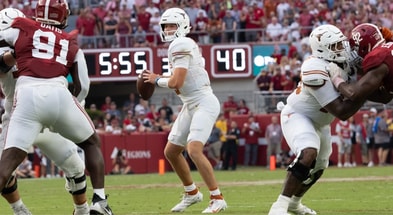You Are What Your Record Says You Are

I hear this Bill Parcells line said a lot with respect to Texas football.
This is both an undeniable reality and a favorite talking point parroted by blowhards who fancy that they’re shocking you back into reality with their real talk if you suggest you’ve seen any aspect of improvement that bodes well for the future. Particularly after a seven year wander in the desert where false hope has been peddled like sea monkeys and snake oil.
“You are what your record says you are.”
You mean to tell me that our record is an accurate catalogue of our wins and losses expressed in numerical form?
Phenomenal insight.
By rhetorical law, there’s some sort of rule that the phrase must be preceded or immediately followed by “That’s the bottom line” or “The simple truth of the matter” or “That’s just harsh reality.” I particularly like when it’s sandwiched between two of them in a perfect cliche hoagie. “The harsh reality is that you are what your record says you are. That’s the bottom line.” POWERFUL.
It’s always revealing that you never hear it said as a logical argument when a non Power Five team is 8-0 and has faced the #100 schedule strength in the country. Instead, we hear Paper Tiger. Context suddenly makes an appearance. So it seems you’re not always what your record says you are. Some undefeated is better than others. By logical extension, some 6-2’s are better than 8-0.
Football is a binary proposition. A win goes 100% in the win column. A loss goes 100% in the loss column. Binary measures are crude markers of progress. If you only measure your children in feet, they’re not making much progress. So there’s some value in looking for finer, more discrete tools.
While you are indeed what your record says you are with respect to those wins and losses, that record can disguise what you will be. If anything, a record is an accurate reflection of what you were. Because football is a dynamic game. A team is either getting better or worse. The 2001 National Champion Oklahoma Sooners were a 7-6 football team the previous season. The team that took the field in their season opener was very different – whatever their previous record. Same for Cam Newton’s Auburn Tigers. Internal conditions changed.
A record is a measure of a past that can’t be duplicated going forward as underlying internal conditions change; an expression of a temporal reality that may or may not hold.
Top 10
- 1New
Chip Kelly just got PAID
Highest paid OC in NFL
- 2Hot
Jeremiah Smith reacts
Chip Kelly news hits hard
- 3Breaking
Alabama reunion
Kalen DeBoer lands OC
- 4
Chip Kelly
Leaving Ohio State for NFL
- 5
AP Poll Projection
Big changes after chaotic week
Get the On3 Top 10 to your inbox every morning
By clicking "Subscribe to Newsletter", I agree to On3's Privacy Notice, Terms, and use of my personal information described therein.
If you watched Vince Young as a sophomore – the guy who got shut out by OU and benched the following week against Missouri – the literalist You Are What Your Record (Stat Line, Level of Play) Says You Are crowd couldn’t have predicted his performance in the Michigan Rose Bowl or that’d he’d never lose again in his college career. Or envisioned his trajectory in 2005. Our QB was 11 of 32 passing in his last two contests, threw two terrible picks at home against the Tigers, a miserable albatross on the offense.
It got better.
Had Texas played South Florida’s schedule, you can be certain we’d be a 6-0 or at least a 5-1 team. Would our record reflect what we truly are? There’s a reason advanced statistics and analytics exist – and it’s not just to clean out the entire scouting operations of MLB and the NBA. If used properly, they marry objectivity with context. They allow us to understand that our performance against San Jose State isn’t particularly useful in understanding our team (400+ yards rushing – our new identity as a power running team confirmed! Chris Warren for Heisman! Kendall Moore should startz!) if in the weeks immediately thereafter the Spartans lose to Utah 54-16 and Utah State 61-10.
It cuts both ways.
A record doesn’t always disguise hidden virtue. It could hide a negative reality. Texas – with our current OL woes, a freshman QB taking too many hits, a DB group struggling with assignments, unreliable special teams – could get worse. Charlie Strong’s 2016 3-3 Texas team certainly did.
The millisecond before Aaron Rodgers’ collarbone shattered against the Vikings, the Packers were 4-1 and the clear NFC favorites. A moment later, they’re still 4-1 as back-up Brett Hundley trots on to the field. Does their record accurately say what they are at that moment? Still NFC favorites? What changed? You are what your record says you are, right?
You are what your record says you are may be a useful reality check for a football team long on delusion and short on results, but don’t pretend it’s an argument. Or analysis. Or anything but a well-worn cliche.
The simple truth of the matter is that’s the bottom line of harsh reality.


























